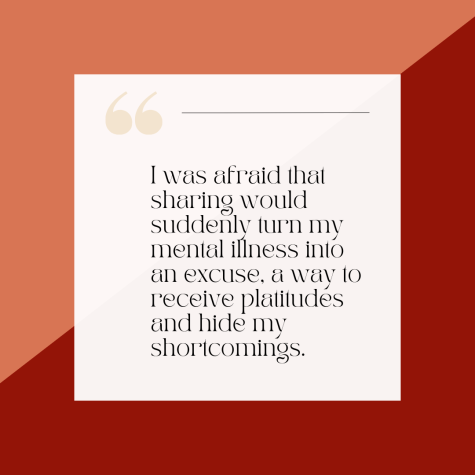Spill Your Guts
Struggling to open up my mental illnesses
March 3, 2023

Honestly, I’m okay with being vulnerable about my depression and anxiety. I know there’s a stigma against people with mental illnesses, but personally, it was never that I was afraid of whether people would judge me. For me, it was the complete inverse: I desperately wanted to share how I felt.
Most people struggle with the lead-up to diagnoses: accepting that mental illness is real, that it could happen to anyone and that it needs to be addressed. But for me, nothing hit me harder than the aftermath: what happens after? No one really talks about what comes next, when you’ve accepted it and addressed it and still can’t figure out how to reconcile it with the rest of your life.
Over the next half year, I watched myself crash and burn, procrastinating, forgetting assignments, ignoring messages and going to bed dreading waking up again. And because no sane person would ever want that for themselves, I did my best to get better. I got a therapist, dropped classes and even got a 504 plan. I thought I would get better, that getting help was going to be the end all be all and yet still I felt anonymous and unknown.
I felt like depression and anxiety were taking over my entire life, yet I couldn’t bring myself to reveal that part of myself, even to the people who care about me. I wanted to tell people, I really did. I wanted my friends to understand me so that I wouldn’t just disappear into the depths of my mental illness with everyone wondering why I had suddenly become such a failure. I went about each day feeling like a grotesque, overfilled balloon, ready to burst at any moment and drown people with my exhaustion.
 It was a vicious cycle, where I felt like a burden to other people (making my friends worried, stressing out my teachers and wasting my parents’ resources) and yet I couldn’t tell people about it because I would just feel like an even bigger burden watching them trying to juggle my mental illness into their lives. My mindset was that, if I make my mental problems into everyone’s problems, then it’s not really my problem anymore, is it? Forcing other people to manage the problems that I cause, especially with the excuse of my mental illness hanging over them, would be a step too far in the ‘glorifying mental illness’ direction. I was afraid that sharing would suddenly turn my mental illness into an excuse, a way to receive platitudes despite my admittedly unhealthy behavior.
It was a vicious cycle, where I felt like a burden to other people (making my friends worried, stressing out my teachers and wasting my parents’ resources) and yet I couldn’t tell people about it because I would just feel like an even bigger burden watching them trying to juggle my mental illness into their lives. My mindset was that, if I make my mental problems into everyone’s problems, then it’s not really my problem anymore, is it? Forcing other people to manage the problems that I cause, especially with the excuse of my mental illness hanging over them, would be a step too far in the ‘glorifying mental illness’ direction. I was afraid that sharing would suddenly turn my mental illness into an excuse, a way to receive platitudes despite my admittedly unhealthy behavior.
Fortunately for me, anxiety does not care about anyone’s feelings and forced my hand when I broke down in a panic attack in front of one of my speech coaches. I was mortified that someone had to witness my crying, reciting “I’m sorry” and trying to explain through my gasping for air. But instead of just assuring me that everything was okay, my coach sat there and quietly listened as I spilled my guts. He offered some gentle advice, made me laugh and nothing seemed to have changed at all in how he behaved around me.
I’m not going to go into detail about that conversation, but I walked out of our meeting feeling lighter, inexplicably. It took several more awkward, unexpected moments like the one with my speech coach for me to realize that it’s not my job to manage how people react to my mental illness.
As I became less uncomfortable with myself, I started to drop hints here and there around my friends. Recently, I finally, officially told them what had happened this past year. They were quiet, but the next day, we walked to school and joked around as if nothing had happened. And nothing did, really. For the people who matter, who know me sometimes better than I know myself, the vast scar left on my life by depression and anxiety wouldn’t make them feel the need to tiptoe around me. Rather, it was a breath of fresh air for all of us to fully see me, for all that I am.



























